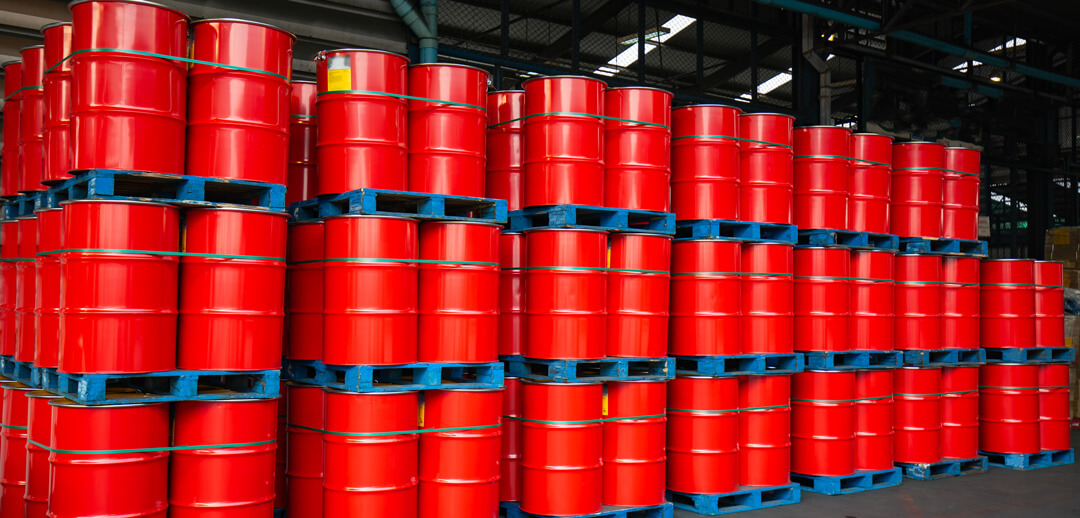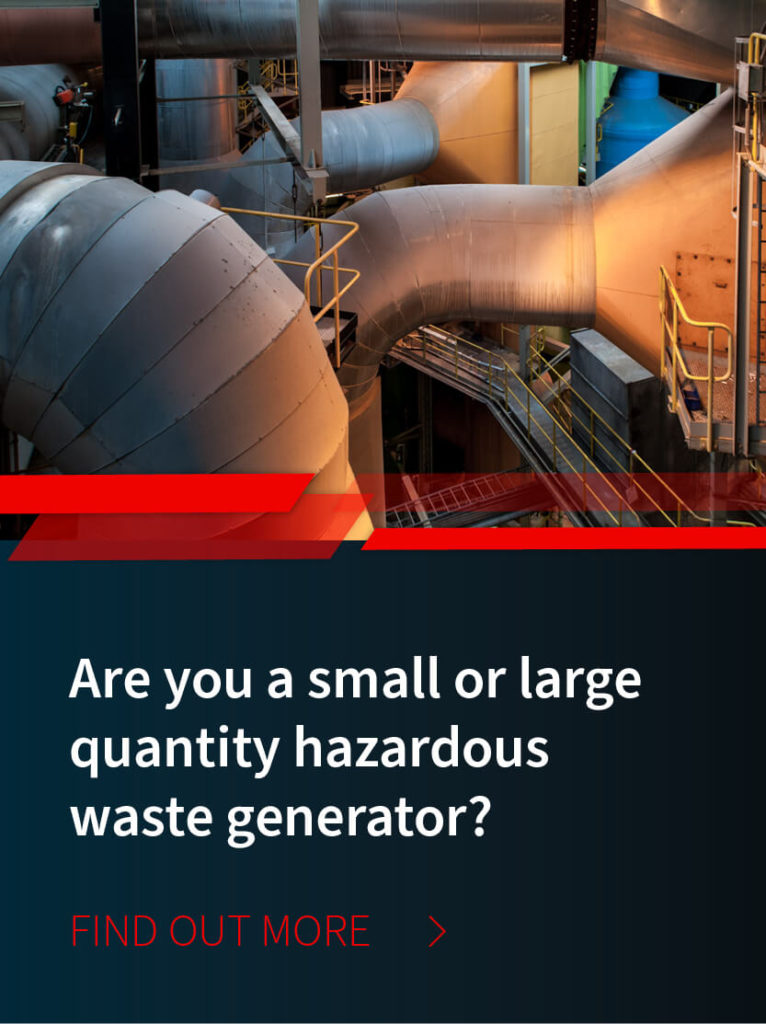
/ IN THIS BLOG
As a service to our customers nationwide, we occasionally zero-in on a particular state to review its regulations for hazardous waste disposal. The present blog focuses on South Carolina hazardous waste regulations.
01 / What authority is in charge of South Carolina hazardous waste regulations?
As do many US states and territories, the Palmetto State adheres closely to RCRA federal regulations when providing guidance to the state’s hazardous waste generators, as well as to companies providing hazardous waste transport, storage, recycling, and/or disposal services to them, with one major exception (covered in section 5 below).
(N.B. If you’re new to South Carolina, per Webster, a palmetto is a kind of palm tree found in the American south that’s smaller than your standard-issue palm tree. We knew you’d want to know.)
Thus, the South Carolina DHEC periodically revises its regulations to ensure that they’re in concurrence with that of the EPA—read: RCRA—and updates are ostensibly posted on this webpage, although going there just gets you a 404 message.
(N.B. The DHEC website is less than robust, and it might be quicker and easier to find fast, friendly, and comprehensive advice here.
02 / How does South Carolina classify hazardous waste?
More or less the same way as does most every other state: dividing hazardous waste into two categories:
-
- Listed wastes. South Carolina uses the federal lists of specific materials deemed to be hazardous by the EPA. There are more than 500 such substances published in the Code of Federal Regulations (40 CFR Part 261) across four separate lists. Thus, “listed waste.”
- Characteristic wastes. If a waste isn’t “listed” (see A), it might otherwise be considered hazardous in South Carolina for one or more of its characteristics. Thus, “characteristic waste.” These characteristics are:
Ignitability—it’s flammable under certain conditions (e.g., some paints, degreasers, or solvents).
Corrosiveness—it’s a substantial acid or base (e.g., battery acid, certain cleaning fluids, or rust removers).
Reactivity—it’s susceptible to exploding or releasing toxic fumes if heated, mixed with water, or pressurized (e.g., certain cyanides or sulfide-bearing wastes).
Toxicity—it’s harmful or fatal if ingested or absorbed, or it can leach toxic chemicals into the soil or ground water if disposed of on land (e.g., wastes containing mercury, lead, or cadmium).
03 / How are different-size hazardous waste generators regulated in South Carolina?
Industries in South Carolina are regulated according to RCRA standards for the amounts of hazardous waste they generate. They are categorized as follows:
Therefore, a properly filled out hazardous waste manifest will identify the materials and codes (which are numeric) to ensure fast and appropriate responses to not only quickly remedy an accident or spill situation, but also minimize environmental damage and keep people as safe as possible.
Very Small Quantity Generator (VSQG). A company is considered a VSQG if it generates 220 lbs. or less of hazardous waste per month. As such, it can store up to 13,200 lbs. of hazardous waste onsite for up to 180 days without a storage facility permit; or up to 270 days if the waste must be transported more than 200 miles for storage, treatment, disposal, or recycling. A VSQG cannot store more than 13,200 lbs. of hazardous waste onsite at any time.
Small Quantity Generator (SQG). A company is considered an SQG if it generates between 220 and 2,200 lbs. of hazardous waste per month; or maximally 2 lbs. of acutely hazardous waste per month. No more than 13,000 lbs. of hazardous waste can be held onsite at any one time. An SQG must have an EPA Identification Number.
Large Quantity Generator (LQG). A company is considered an LQG if it generates more than 2200 lbs. of hazardous waste per month, or more than 2 lbs. of acutely hazardous waste per month. An LGQ must have an EPA Identification Number.
04 / How is hazardous waste transported in South Carolina?
For anyone intending to transport hazardous waste within its borders, South Carolina requires a permit per the state’s hazardous waste management regulations—all 1,402 pages of which you can peruse here.
Clicking here will get you to an application form that you can populate electronically, but you have to print it and send it along by snail mail (accompanied by your Certificate of Insurance) to the S.C. Department of Health and Environmental Control, Bureau of Land and Waste Management, Division of Compliance and Enforcement, 2600 Bull Street Columbia, S.C. 29201
05 / How do South Carolina hazardous waste management rules differ from federal ones?
The Resource Conservation and Recovery Act, which established the EPA more than 50 years ago, is unusual for delegating the primary responsibility for implementing federal hazardous waste regulations to individual states.
For this reason, individual states can differ from federal guidelines about what is a hazardous waste and how it should be handled. More importantly, state regulations for hazardous waste management are often stricter than their federal counterparts. South Carolina’s rules about notification and recordkeeping for VSQGs are an example. We’re quoting here:
VSQGs are subject to the following additional requirements in South Carolina:
Recordkeeping. VSQGs must determine whether a waste is hazardous using these specified steps. (See S.C. Code Regs. 61-79.262.11(a) through (d))
-
- “The hazardous waste determination for each solid waste must be made at the point of waste generation, before any dilution, mixing, or other alteration of the waste occurs, and at any time in the course of its management that it has, or may have, changed its properties as a result of exposure to the environment or other factors that may change the properties of the waste such that the RCRA classification of the waste may change.”
- “A person must determine whether the solid waste is excluded from regulation under R.61-79.261.4.” >
- “If the waste is not excluded under R.61-79.261.4, the person must then use knowledge of the waste to determine whether the waste meets any of the listing descriptions under subpart D of R.61-79.261. Acceptable knowledge that may be used in making an accurate determination as to whether the waste is listed may include waste origin, composition, the process producing the waste, feedstock, and other reliable and relevant information. If the waste is listed, the person may file a delisting petition under R.61-79.260.20 and 260.22 to demonstrate to the Department that the waste from this particular site or operation is not a hazardous waste.”
- “The person then must also determine whether the waste exhibits one or more hazardous characteristics as identified in subpart C of R.61-79.261 by following the procedures in paragraph (d)(1) or (2) of this section, or a combination of both.”
Notification. VSQGs must notify the Department within 30 days of producing a new hazardous waste See S.C. Code Regs. 61-79.262.12. Again, to quote:
-
- “Every generator within the state who produces a hazardous waste and has not previously done so shall file a Site Identification Form for that waste within thirty (30) days of the effective date of this regulation
- “Every generator within the state who produces a new hazardous waste shall file a revised or new Site Identification Form for that waste within thirty (30) days after such waste is first produced.”
- “Every generator within the state who produces a hazardous waste which is classified or listed for the first time by a revision of R.61-79.261 shall file a revised or new Site Identification Form for that waste within ninety (90) days after the effective date of such revision. 344 | Regulation 61-79.262”
- “The notification shall be on a form shall be completed as required by the instructions supplied with such forms. The information to be furnished on the form shall include, but not be limited to, the location and general description of such activity, the identified or listed hazardous wastes handled by such person and, if applicable, a description of the production of energy recovery activity carried out at the facility and such other information as deemed necessary. A generator shall file a revised or new Site Identification Form whenever the information previously provided becomes outdated or inaccurate.”
06 / Where can I get help understanding South Carolina hazardous waste management rules?
You need a hazmat solution that will maximize efficiency, lower the cost, and minimize the compliance risks of doing business in your state. And with over 30 years of nationwide experience specializing in hazardous waste management, you can trust MCF specialists to know what might make South Carolina—or any other state—unique in matters of hazardous waste disposal.
Don’t go it alone.
We can help you develop a hazardous waste management protocol that takes into careful account the regulatory complexities of your particular state or region to achieve the highest standards of sustainability.
For more information, contact us today. Or phone 866.315.8116
And thank you for reading our blog!
Robert Losurdo
President, COO








